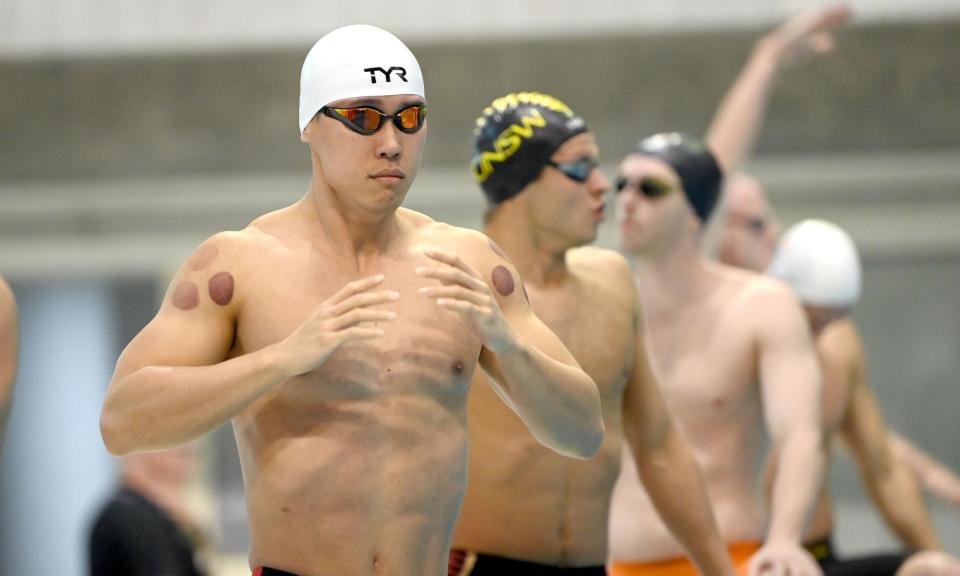Will Yang: the Olympic swim hopeful bridging the divide between Australia and China

If anyone bridges the sometimes troubled sporting relationship between Australia and China, it is Paris Olympic hopeful Will Yang.
Born in Australia as Yang Xu, the son of successful Chinese businessman Yang Qingquan, he returned to China with his parents at the age of four and lived in Guangzhou, where he learned to swim, before coming back to Sydney at 11 to finish school at Knox Grammar, where he became known as William Xu Yang.
In high school the athletic teenager preferred the basketball court to the swimming pool, but he began to take swimming more seriously while he was at the University of Sydney studying design and architecture, aged 19.
“[That’s when] I started to think this could be something very enjoyable and fun, so I started training more and more,” the 25-year-old powerhouse said.
Yang may have been a latecomer to a quintessentially Australian sport where hopeful pre-teens are churning through kilometres in the pool twice a day, but he was an immediate bloomer.
Little more than a year later, he won national titles in the 50m backstroke and 50m butterfly, and then won the 50m butterfly at the 2019 World University Games in Naples, training under former Australian team swimmer Bobby Hurley.
Despite his Chinese heritage, Yang said he never considered representing China rather than Australia, saying simply “I was born here… and I love it here”.
After two years of Covid disruption, he emerged as one of Australia’s fastest freestyle sprinters in 2022, winning the national 100m title and helping the Australian sprint relay teams to gold medals at the 2022 world championships in Budapest and the Commonwealth Games in Birmingham.
He seemed poised to make an even bigger impact last year before excruciating pain in his lower back floored him, just before the Australian trials for the world championships in Fukuoka. Medical scans revealed a benign tumour in his spinal canal, impinging on a nerve, which required immediate surgery.
“It got that bad that I couldn’t really walk so I had to get the surgery done and I was so glad I did,’’ he said. “I got really lucky. After the scan, immediately I was calling every surgeon in New South Wales and then I quickly found one, at Westmead Private Hospital. His name is Doctor Jun Kim and he’s a fabulous surgeon.
“He was like ‘your case seems very urgent so, let’s move you to next week’. The time between me finding this out to getting the surgery was less than 10 days so there wasn’t much time to process it in my head. But then everything went really well. It was a long recovery but things went very well.”
He was working his way back into training last November when a cartilage tear in his shoulder grounded him for another two months. “But once again I was lucky it healed itself,” he said.
Yang had few expectations when he returned to training with the NSW Institute of Sport squad under coach Adam Kable in January, but he has made an eye-catching comeback.
He reclaimed the NSW title in March before setting a personal best time of 48.20sec to finish second behind 2016 Olympic champion Kyle Chalmers at last month’s Australian Open Championships on the Gold Coast.
Asked if he had expected to be back in contention so quickly, Yang said: “Honestly, not at all. I think it’s just at the moment I’m really enjoying training. Sometimes I forget that Olympic year is this year.
“My perspective just changed a lot after what I went through last year, I just want to be healthy and enjoy the sport. I don’t think too much about my times or my performance. Every day I just do the best I can and I’m just happy to be here.”
His plan now is to “ride that momentum” through to next month’s Olympic trials in Brisbane.
Related: Inside anti-doping’s civil war: anger and suspicion spill into the open
“It would mean a lot [to make the Olympic team],’’ he said. “That would just mean I didn’t let a surgery or any setbacks define who I am or my career. I think I’m tougher than that. I can come back from any setback. It made me tougher mentally. I just view it as a very positive experience. There’s no point feeling sorry for yourself.”
Kable said that Yang was a dedicated but happy-go-lucky presence in his training squad.
“He’s very level and upbeat, but he’s actually a very focussed athlete,” the coach said. “He’s very black and white. He keeps it very simple. He has unbelievable trust in me. He just says: ‘That’s your area, that’s your expertise, you tell me what to do and I’ll do it’.
“He just loves racing, and loves going to the gym and he loves training and he’s in a good mood all the time. He loves coming to the pool every day. He’s a pleasure to work with.”
Yang seems to straddle his two cultures with ease, regardless of the occasional tensions that arise between Australia and China, in the swimming pool and out.
Most recently there was suspicion among Australian swimmers when the news broke that 23 Chinese swimmers were cleared of doping before the Tokyo Olympics, despite positive tests to a banned heart drug.
But Yang said he generally let such ructions wash over him.
“I just focus on my swimming and try to swim as fast as possible,” he said.
That’s working for him so far. He took a commanding win in the 100m freestyle (48.47sec) at the Sydney Open meet on Friday, his last race before the Olympic trials.

